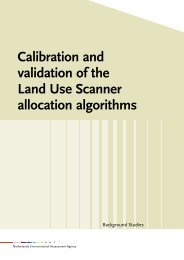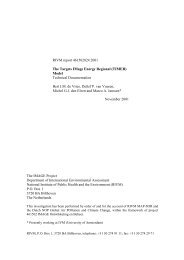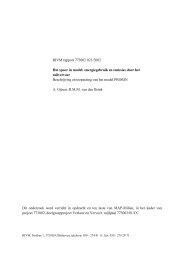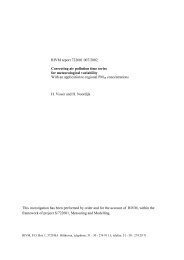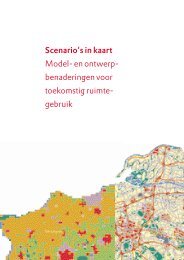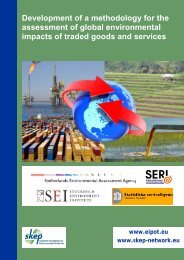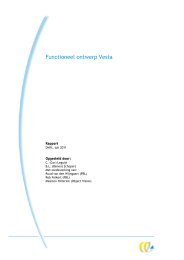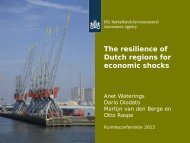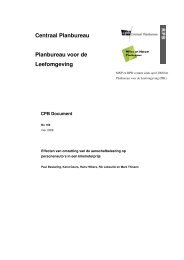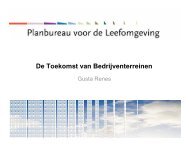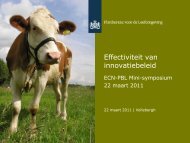RIVM report xxxxxx xxx
RIVM report xxxxxx xxx
RIVM report xxxxxx xxx
Create successful ePaper yourself
Turn your PDF publications into a flip-book with our unique Google optimized e-Paper software.
<strong>RIVM</strong> <strong>report</strong> 773301 001 / NRP <strong>report</strong> 410200 051 page 129 of 142<br />
participants of other NRP projects. Also, extensions may be incorporated, when new data become<br />
readily available in the format required for EDGAR inventories.<br />
&<br />
5HOHYDQFHDQGXVH IRUVFLHQFHDQGSROLF\PDNLQJ<br />
& The results of YDOLGDWLRQ DQG XQFHUWDLQW\ DQDO\VLV will help to improve our scientific<br />
understanding of the regional importance of a number of sources of CH 4 and N 2 O and of other GHGs.<br />
In addition to pure scientific understanding, this has also policy relevance, since it may change ideas<br />
on where and how to develop most effective control policies. The results of this work can be also<br />
used:<br />
(1) to provide recommendations for improving the default methodology for preparing national<br />
inventories,<br />
(2) to assist the secretariat to the FCCC in evaluating and validating national inventories, and<br />
(3) to test compliance of regional or national emissions with agreements in the FCCC.<br />
&0RQLWRULQJDQGLQWHJUDWLRQ relates to integration efforts and exchange of information between<br />
NRP projects and international research groups, regarding fluxes to and from the atmosphere and<br />
radiative forcing. Also, the EDGAR team, by its contacts with the two groups, plays a key role as<br />
intermediate between the scientific level (GEIA, NRP) and the policy level (Dutch government,<br />
IPCC/FCCC). Aggregated emission factors from EDGAR will be very useful for IPCC Expert Groups<br />
to determine default factors which are certified to be in line with current estimates of global emission.<br />
Annual evaluation of changes in time of emission patterns, by country or region, sector or compound<br />
will contribute to most effective environmental policy planning, both at the national and as well as at<br />
the international level. In addition, it may contribute to planning of policy relevant future research<br />
directions on emissions and atmospheric modelling.<br />
&,PSURYHGHVWLPDWHV of radiative forcing of climate produced from the global aerosols inventory<br />
are important both from a policy and a scientific point of view. The other improvements and<br />
extensions of EDGAR have various uses. Inventories for other compounds and representative time<br />
profiles will increase the value of results of atmospheric models and their assessment of which are the<br />
most policy relevant emissions. In general, inventories for the mentioned compounds are required to<br />
decide - partly on the results of atmospheric models using these data as inputs - whether or not<br />
additional policies are needed, and if so, which and where they are most effective.<br />
'<br />
,QWHUQDWLRQDOUHOHYDQFH<br />
'. 9DOLGDWLRQDQGXQFHUWDLQW\DQDO\VLV is of concern for both policy making and modellers. About<br />
40 institutes from all over the world showed an interest in using both GEIA and EDGAR inventories<br />
during the 8 th CACGP Symposium/2 nd Scientific Conference of IGAC held in Fuji-Yoshida (JPN) in<br />
1994, amongst others: NCAR, Boulder; prof. G. Brasseur; MPI Hamburg; MPI Mainz, prof. P.<br />
Crutzen; various working groups of Global Emission Inventories Activity (GEIA), of the<br />
International Global Atmospheric Chemistry Programme (IGAC) of IGBP, and contributors such as<br />
CDIAC at Oak Ridge National Laboratory (ORNL) and Environment Canada; Secretariat to the<br />
INC/FCCC, dr. J. Swager; Netherlands Energy Research Foundation (ECN), prof.dr. J. Slanina;<br />
Royal Netherlands Meteorological Institute (KNMI), dr. H. Kelder, dr. P.F.J. van Velthoven. GEIA<br />
working groups notably on CO 2 of Marland c.s. and on SO x /NO x of Benkovitz c.s., and Brasseur are<br />
also interested in cooperation on uncertainty estimates and time profiles. Validation results will be<br />
used for improving default methodology and default emission factors of the IPCC guidelines for<br />
preparing national inventories. In support of the FCCC, to contribute to the development of IPCC<br />
guidelines for national GHG inventories, Berdowski and Olivier are leading or participating into<br />
IPCC expert groups on emissions.




